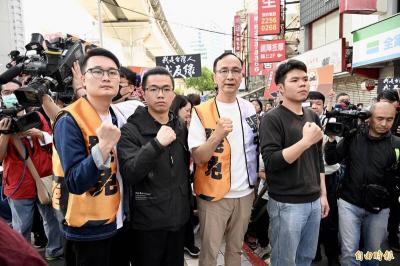Lawmakers across party lines on Thursday remained silent on the agreement of the preparatory committee for the National Congress on Judicial Reform to list adultery as an offense that needs to be decriminalized, with only a few openly voicing support or opposition.
Chinese Nationalist Party (KMT) Legislator Lin Wei-chou (林為洲) said the party had already received a great many reactions — mostly negative — regarding the news that decriminalizing adultery would be a part of future judicial reforms.
Lin called on the government to hold more public hearings and listen to opinions from all sides, adding that judicial reforms should not be carried out until there is a social consensus.
People First Party (PFP) Legislator Lee Hung-chun (李鴻鈞) said that while many counties do not treat adultery as a criminal and punishable offense, the culture in Taiwan still tends to be conservative on such social issues.
Decriminalizing adultery could have a social impact comparable with the decriminalization of class-4 narcotics, which led to an increase in the number of younger drug users, Lee said.
New Power Party (NPP) Legislators declined to comment on the development.
Democratic Progressive Party (DPP) Legislator Tuan Yi-kang (段宜康) said he fully supported the motion and said adultery cases should be adjudicated in civil courts, as treating adultery as a criminal issue was outdated and unfair.
KMT caucus convener Sufin Siluko (廖國棟) said he opposes the proposal and that decriminalizing adultery would cause severe change within society.
The KMT supports “family values” and would keep those values in mind when scrutinizing the amendment in the Legislative Yuan, Sufin said.
The committee also called for the abolition of Article 239 of the Code of Criminal Procedure (刑事訴訟法), should Article 239 of the Criminal Code not be abolished.
Article 239 of the Code of Criminal Procedure states that under the “no trials without complaint” principle, if charges against one of the accomplices are dropped, charges against all other suspects would need to be dropped as well. Under Article 239 of the Criminal Code, however, adulterers would still be charged should their spouse retract the charges.
The committee has held five meetings to date, though it has experienced several setbacks, including opposition by Prosecutor-General Yen Da-ho (顏大和), who said that the reforms were a publicity stunt.
Two of the committee’s original members have resigned, citing a lack of respect among the members, too many issues on the agenda and the committee overreaching its authority.

The Ministry of Economic Affairs has fined Taobao NT$1.2 million (US$36,900) for advertisements that exceeded its approved business scope and ordered the Chinese e-commerce platform to make corrections in the first half of this year or its license would be revoked. Lawmakers have called for stricter supervision of Chinese e-commerce platforms and more stringent measures to prevent China from laundering its goods through Taiwan as US President Donald Trump’s administration cracks down on origin laundering. The legislature’s Finance Committee yesterday met to discuss policies to prevent China from dumping goods in Taiwan, inviting government agencies to report on the matter. Democratic Progressive Party

Taiwan and its Pacific ally Tuvalu on Tuesday signed two accords aimed at facilitating bilateral cooperation on labor affairs, according to Taiwan’s Ministry of Foreign Affairs (MOFA). The governments inked two agreements in Taipei, witnessed by Foreign Minister Lin Chia-lung (林佳龍) and visiting Deputy Tuvaluan Prime Minister Panapasi Nelesone, MOFA said in a news release. According to MOFA, the agreements will facilitate cooperation on labor issues and allow the two sides to mutually recognize seafarers’ certificates and related training. Taiwan would also continue to collaborate with Tuvalu across various fields to promote economic prosperity as well as the well-being of their

The Taipei District Prosecutors’ Office has continued its investigation into allegations of forged signatures in recall efforts today by searching the Chinese Nationalist Party’s (KMT) city chapter and questioning several personnel including the chapter director, according to media reports. Among those questioned and detained were KMT Taipei chapter director Huang Lu Chin-ju (黃呂錦茹), chapter secretary-general Chu Wen-ching (初文卿), chapter secretary Yao Fu-wen (姚富文) and first district committee executive director Tseng Fan-chuan (曾繁川). Prosecutors said they would not confirm reports about who had been summoned. The investigation centers on allegations that the ongoing recall campaigns targeting Democratic Progressive Party legislators Rosalia Wu (吳思瑤)

Several Chinese Nationalist Party (KMT) officials including Chairman Eric Chu (朱立倫) are to be summoned for questioning and then transferred to prosecutors for holding an illegal assembly in Taipei last night, the Taipei Police said today. Chu and two others hosted an illegal assembly and are to be requested to explain their actions, the Taipei City Police Department's Zhongzheng (中正) First Precinct said, referring to a protest held after Huang Lu Chin-ju (黃呂錦茹), KMT Taipei's chapter director, and several other KMT staffers were questioned for alleged signature forgery in recall petitions against Democratic Progressive Party (DPP) legislators. Taipei prosecutors had filed